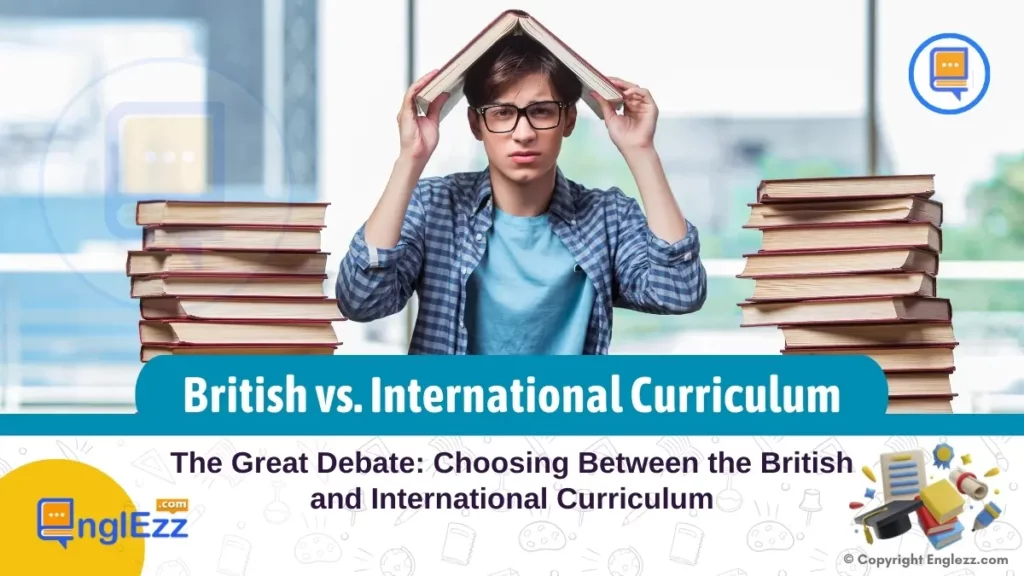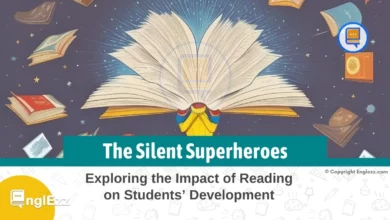In the vast landscape of education, one crucial decision stands at the crossroads of shaping young minds – choosing between the British and International curriculum. This debate isn’t merely about syllabi; it’s a profound consideration that impacts students’ academic journeys and future endeavors. As educators, parents, and students navigate this pivotal choice, understanding the nuances of each curriculum becomes paramount in laying a strong educational foundation.
Table of Contents
- The Great Debate: British vs. International Curriculum – Which is Right for You?
- British Curriculum: GCSEs and A-Levels
- International Curriculum: IB Program
- Preparing for Future Careers: Impact of Educational Choices
- College Admissions
- Parental Perspectives: Decision-Making Process
- Educator Insights: Best Practices in Teaching British vs. International Curricula
- Making an Informed Decision between British and International Curricula
- Deciding on the Right Educational Path
- Frequently Asked Questions:
- 1. Q: Is one curriculum better than the other?
- 2. Q: Do colleges prefer one curriculum over the other?
- 3. Q: Can students switch between British and International Curricula?
- 4. Q: How do I know which curriculum is right for my child?
- 5. Q: What are some key considerations when deciding between curricula options?
The Great Debate: British vs. International Curriculum – Which is Right for You?
The allure of the British curriculum lies in its tradition-rich focus on specialization and in-depth subject knowledge through examinations like GCSEs and A-Levels. On the other hand, the International Baccalaureate (IB) program offers a holistic approach, enriching students with critical thinking skills and global perspectives. Deciding on the right path isn’t just about textbooks; it’s about sculpting well-rounded individuals ready to tackle the complexities of an evolving world.

Join us as we delve into this captivating discussion, offering insights that inspire informed decisions for unlocking each student’s full potential while highlighting how educational choices today shape tomorrow’s leaders. Embark on this enlightening journey with us!
British Curriculum: GCSEs and A-Levels
When delving into the British curriculum, one encounters the world-renowned General Certificate of Secondary Education (GCSE) and Advanced Level (A-Level) programs. GCSEs are typically taken by students aged 14-16 and serve as a foundation for more advanced study. They offer a diverse range of subjects, allowing students to explore various disciplines before specializing in their A-Levels. A-Levels, on the other hand, are undertaken between ages 16-18 and provide an in-depth study of chosen subjects, leading to greater specialization.
One key feature of the British curriculum is its emphasis on depth of knowledge. For instance, in A-Level subjects like Mathematics or Physics, students delve deeply into complex theories and problem-solving techniques, fostering a profound understanding that lays a strong academic foundation for university studies. This focus on specialization ensures that students develop expertise in their chosen fields, equipping them with the necessary skills to excel in higher education.
Moreover, the structure and grading system of GCSEs and A-Levels demand rigorous academic engagement. Students are required to demonstrate not only knowledge but also critical thinking skills through essay-based assessments and practical applications. By navigating such challenging assessments, learners cultivate analytical abilities essential for success in tertiary education settings where independent thought is highly valued. In essence, the British curriculum’s structured approach prepares students not only academically but also intellectually for the demands of higher education pathways.
International Curriculum: IB Program
The International Baccalaureate (IB) Program stands out for its holistic approach that focuses on developing well-rounded individuals equipped to thrive in a globalized world. Unlike the British curriculum’s emphasis on specialization, the IB program encourages students to explore a wide range of subjects across disciplines, fostering not only depth but also breadth of knowledge. For instance, while a British system-oriented student may excel in sciences due to early specialization, an IB student might have a well-rounded understanding by delving into science alongside humanities and languages.
One of the key strengths of the IB program lies in its ability to enhance critical thinking skills and foster global awareness. By engaging students in interdisciplinary learning experiences and encouraging them to tackle complex real-world issues through projects like the Extended Essay and Theory of Knowledge (TOK), the IB nurtures analytical skills essential for success beyond academic realms. For example, an IB student working on a project about climate change might not only develop scientific research abilities but also gain insights into social, economic, and ethical dimensions of environmental challenges.
Moreover, participation in IB exposes students to diverse perspectives and promotes intercultural understanding through components like Creativity-Activity-Service (CAS) that encourage community engagement. This exposure goes beyond traditional classroom settings to provide students with firsthand experiences that prepare them for navigating multicultural environments in today’s interconnected society. Through activities like hosting cultural events or volunteering internationally, IB students develop empathy, adaptability, and open-mindedness – crucial traits for thriving in a global workforce where collaboration and communication with people from diverse backgrounds are paramount.
Preparing for Future Careers: Impact of Educational Choices
Choosing between the British and International curriculum can significantly influence a student’s future career path. The British Curriculum, known for its specialization and depth of knowledge, equips students with in-depth understanding and expertise in specific subjects like Math, Science, or Humanities. This specialized approach can be beneficial for students who already have a clear career goal in mind. For instance, a student aspiring to become an engineer might benefit from the intense focus on STEM subjects offered by the British curriculum, preparing them well for the rigors of an engineering program at university.
On the other hand, the International Baccalaureate (IB) Program focuses on holistic education, emphasizing critical thinking skills, global awareness, and interdisciplinary learning. These aspects nurture transferable skills essential for a wide range of careers that require adaptability and problem-solving abilities across various domains. For example, a student pursuing IB may develop strong communication skills through extended essay assignments and learn to collaborate effectively with peers from diverse cultural backgrounds—an invaluable asset in today’s global job market where cross-cultural competence is highly valued.

When it comes to employability factors linked to different curricula choices, employers often seek candidates who not only possess subject-specific knowledge but also demonstrate soft skills such as communication, teamwork, creativity, and adaptability. While the British curriculum offers depth in specialized areas relevant to certain professions, the IB program hones essential skills applicable across industries and roles. Ultimately, both educational paths can lead to successful careers; however, the decision should align with individual strengths, interests, and long-term career aspirations to maximize future employability opportunities.
College Admissions
College admissions officers often pay close attention to the educational background of applicants, including the type of curriculum they have followed. When comparing British and International curricula, colleges typically recognize the strengths and uniqueness of each system. British curricula, with their emphasis on specialization and in-depth knowledge in specific subjects through qualifications like GCSEs and A-Levels, can showcase a student’s depth of understanding in particular areas. On the other hand, International Baccalaureate (IB) programs are admired for their holistic approach that nurtures critical thinking skills, interdisciplinary awareness, and global perspectives.
Take into account your child’s strengths, interests, and learning preferences when choosing a curriculum. The British curriculum offers specialization and depth of knowledge, catering well to students who excel in specific subjects or prefer a more focused approach. On the other hand, the International Baccalaureate program emphasizes a holistic education that nurtures critical thinking skills and global awareness. By understanding how your child learns best, you can select the curriculum that aligns with their educational needs.
In recent years, college admission trends have shown a growing appreciation for students who exhibit a balance between specialization and versatility. While British curriculum graduates may shine with expertise in certain subjects, IB candidates stand out with their well-rounded skill sets and adaptability. Therefore, when choosing between the British or International curriculum, students should consider their future educational goals and aspirations to align their academic path with their desired college entrance requirements.
For example, if a student dreams of pursuing a career in law or medicine where specialized knowledge is crucial, excelling in the British curriculum with its focused subject areas could be advantageous during college admissions. Conversely, students aiming for careers in international relations or global business might benefit from the broader worldview cultivated by an IB program. By understanding how colleges perceive different curriculum experiences and recognizing the importance of aligning academic backgrounds with future career paths, students can make informed decisions that enhance their chances of gaining acceptance into their desired universities.
Parental Perspectives: Decision-Making Process
When it comes to selecting the right educational pathway for their children, parents often face a multitude of concerns and priorities. Some parents might lean towards the British curriculum for its structured approach that allows students to specialize early in specific subjects like mathematics or science, aiming to lay a solid foundation for future academic pursuits. On the other hand, some parents might prefer the International Baccalaureate (IB) program for its holistic nature that fosters critical thinking skills, creativity, and global awareness. Understanding these contrasting approaches can help parents align their choices with their child’s strengths and aspirations.
Parents play a crucial role in guiding their children towards the most suitable academic pathway. By actively involving themselves in discussions with educators and understanding the nuances of different curricula, parents can better support their children’s educational journey. Offering a balance between gentle guidance and empowering autonomy is key to helping students make informed decisions about their learning paths. Moreover, creating an open dialogue at home where children feel comfortable discussing their interests, strengths, and uncertainties can aid parents in making collaborative decisions about curriculum choices.
For parents navigating the complex landscape of educational options, here are some tips on supporting their child’s educational choices:
1. Encourage exploration: Provide opportunities for your child to try out different subjects or extracurricular activities to discover where their interests lie.
2. Foster communication: Keep conversations about education open and constructive, allowing your child to express their thoughts on what type of curriculum they feel will best suit them.
3. Seek professional advice: Consult with teachers or academic counselors who can offer insights into your child’s academic strengths and areas for growth while considering various curriculum options.
By understanding parental concerns, taking an active role in guiding students towards appropriate pathways, and providing support through effective communication and exploration opportunities, parents can play a pivotal role in shaping their children’s educational experiences positively.
Educator Insights: Best Practices in Teaching British vs. International Curricula
In the realm of education, educators play a pivotal role in shaping students’ learning experiences and preparing them for the future. When it comes to teaching the British curriculum, incorporating interactive and hands-on activities can significantly boost student engagement. For example, in a History class focusing on World War II, organizing a mock trial where students take on roles of different historical figures can make learning both fun and educational. Additionally, utilizing technology such as interactive quizzes or virtual field trips can enhance understanding and retention of complex concepts found in subjects like Mathematics or Sciences.
On the other hand, teaching the International Baccalaureate (IB) Program calls for innovative approaches that promote critical thinking and global awareness. Encouraging students to work on interdisciplinary projects that address real-world issues fosters a deeper understanding of the material covered. For instance, an IB Language and Literature lesson could involve analyzing literature from diverse cultures to develop empathy and an appreciation for different perspectives. Incorporating experiential learning opportunities like community service projects not only enriches students’ educational experience but also instills values of compassion and social responsibility.
Reflect on your child’s future career aspirations before deciding on a curriculum. The British curriculum’s emphasis on specialization can be beneficial for students who have clear career paths in mind and want to dive deep into a particular subject area early on. Conversely, the IB program equips students with transferable skills such as research abilities, communication skills, and intercultural competence, making it ideal for those considering diverse career paths or international opportunities. By aligning the curriculum choice with your child’s career goals, you can set them up for success in their chosen field.
To empower educators navigating different curricula, professional development opportunities tailored to each system are paramount. Workshops focusing on subject-specific pedagogical strategies help teachers deliver high-quality instruction aligned with the standards of the British Curriculum’s GCSEs and A-Levels. Similarly, specialized training programs for IB educators equip them with tools to effectively implement inquiry-based learning methods unique to the IB Program’s philosophy. Continued professional growth through conferences, online courses, and collaboration with colleagues ensures that educators remain at the forefront of innovative teaching practices in their respective curricula domains.
By embracing these best practices tailored to either the British or International curricula, educators can create dynamic learning environments that cater to diverse student needs while fostering a love for lifelong learning.Implementing effective teaching strategies customized for each curriculum allows educators to nurture well-rounded individuals equipped with both specialized knowledge and essential soft skills necessary for success in today’s ever-evolving world of academia and beyond.
Making an Informed Decision between British and International Curricula
In the educational landscape, choosing between the British and International curriculum is a pivotal decision that impacts a student’s learning journey and future prospects. The British Curriculum, with its focus on specialization through GCSEs and A-Levels, offers in-depth knowledge and prepares students for higher education in specialized fields. On the other hand, the International Baccalaureate (IB) Program takes a holistic approach, fostering critical thinking skills, global awareness, and adaptability for diverse career paths. Understanding these distinct educational pathways allows parents and educators to guide students effectively based on their strengths, aspirations, and learning preferences.

When making this crucial decision, it is essential to consider how each curriculum aligns with the individual’s career goals and college admission aspirations. British Curriculum can be advantageous in providing specialized knowledge relevant to specific career paths early on, enhancing employability within certain industries. Conversely, the IB program equips students with transferable skills highly sought after by universities and employers alike. By comprehensively evaluating these factors alongside parental guidance and educator insights into effective teaching practices for each curriculum type, individuals can make informed choices that set them on a path towards academic success and personal fulfillment.
Ultimately, whether opting for the British or International curriculum rests on understanding the unique strengths they offer in shaping well-rounded individuals ready to face the challenges of tomorrow’s world. By recognizing how each curriculum instills vital skills while catering to different learning styles, students can harness their potential fully.
Embracing diverse perspectives from educators experienced in both curricula aids in navigating this decision-making process with clarity and confidence. Through thoughtful consideration of all aspects discussed in this debate – from specialization versus holistic approach to future career impact – individuals can pave a path that aligns perfectly with their educational aspirations and sets them up for lifelong learning success.
Deciding on the Right Educational Path
In conclusion, the choice between the British and International Curriculum boils down to understanding your unique educational goals, learning styles, and future aspirations. The British curriculum offers a specialized approach that deepens knowledge in specific subjects, preparing students for a focused academic journey and future careers needing in-depth expertise.
On the other hand, the International Baccalaureate program nurtures well-rounded individuals by fostering critical thinking, global awareness, and transferable skills crucial for diverse career paths in our interconnected world.
Don’t hesitate to seek advice from teachers, counselors, or educational consultants when making this important decision. Educators with experience in both British and International curricula can provide valuable insights based on your child’s academic profile and learning style. Additionally, consulting college admission advisors can offer guidance on how different curricula are perceived by universities and how they may impact college admissions processes. By leveraging the expertise of professionals in the field of education, you can make an informed choice that sets your child on the path to academic success.
Ultimately, when making this pivotal decision, consider your child’s strengths, interests, and long-term objectives. Seek insights from educators, understand college admission trends related to different curricula experiences, and involve parents in guiding this important academic direction. By weighing these factors thoughtfully and aligning them with the holistic benefits of both curricula options, you can confidently choose the path that best supports your educational growth and future endeavors.
Frequently Asked Questions:
1. Q: Is one curriculum better than the other?
– A: Neither curriculum is inherently better; it depends on individual preferences and goals.
2. Q: Do colleges prefer one curriculum over the other?
– A: Colleges value diverse educational experiences; what matters most is how students engage with their chosen curriculum.
3. Q: Can students switch between British and International Curricula?
– A: While transitioning may require adjustment, many schools offer pathways for students to transition if needed.
4. Q: How do I know which curriculum is right for my child?
– A: Consider your child’s strengths, interests, college aspirations, and consult with educators for guidance.
5. Q: What are some key considerations when deciding between curricula options?
– A: Think about specialization vs. holistic learning approaches, career goals alignment, college admission paths impact, parental involvement importance in decision-making process & student engagement preference levels.









🧑🎓📝👉 Unraveling the Great Debate: British vs. International Curriculum – Your guide to choosing the ideal educational path for your child. 📧🔗 Get free educational resources & courses at:
https://bit.ly/englEzz
👍 Don’t miss out! Follow and like EnglEzz for more valuable insights!
#englezz #courses #worksheets #ielts #cpd #tefl #efl #learnenglishonline #esl #teachingjobs #classroom #flashcards #printables